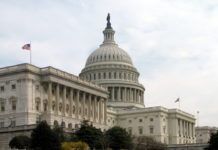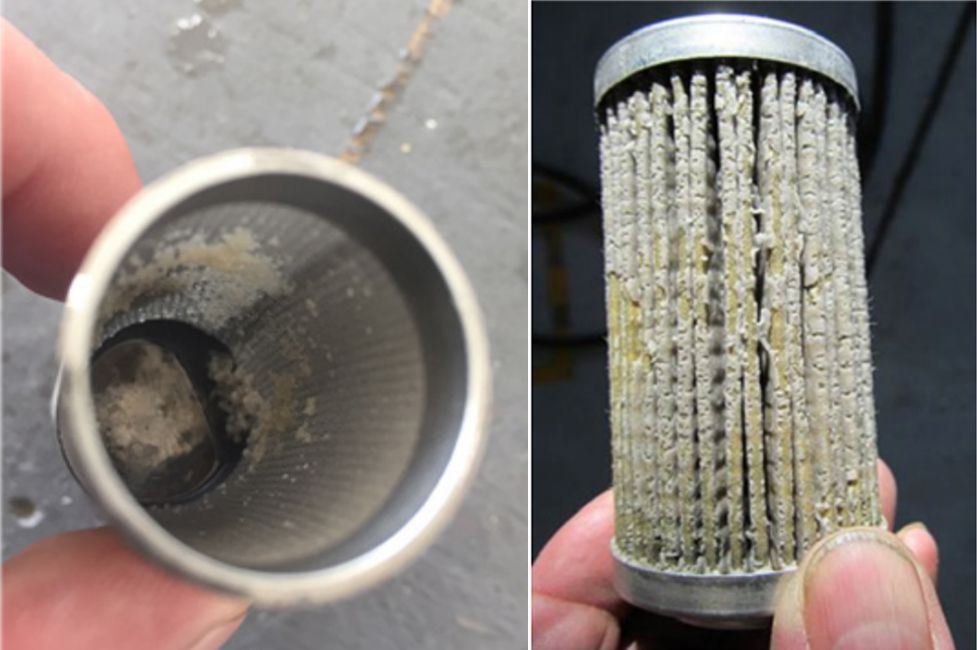The NTSB has issued a Safety Alert asking jet fuel providers to take measures to prevent fuel contamination by diesel exhaust fluid (DEF). The board warned that the addition of DEF to jet fuel can cause a chemical reaction that forms crystalline deposits in the fuel system, increasing the risk of engine failure due to deposit accumulation on filters, engine fuel nozzles and fuel metering components.
DEF is a clear, colorless liquid commonly added to the emissions systems of ground vehicles, including airport refueling trucks, to reduce nitrogen oxide (NOx) emissions. “DEF can be mistaken for other clear, colorless liquids, such as fuel system icing inhibitors (FSII),” the NTSB said in the Safety Alert (PDF). “Both products can be purchased in bulk and transferred to smaller containers for ease of use. Both are usually stored in milky white containers. Also, airport refueling trucks are serviced with both products.”
According to the NTSB, it is aware of two incidents in which DEF-contaminated fuel has been distributed to aircraft. The first occurred in November 2017 at Eppley Airfield (OMA) in Omaha, Nebraska, and the second in August 2018 at Miami-Opa Locka Executive Airport (OPF) in Opa-locka, Florida. Both incidents were the result of “inadvertent introduction of DEF into aircraft fuel tanks by way of a refueling truck FSII reservoir.” The board is also investigating a May 2019 incident involving a Cessna C550 that experienced a total loss of engine power to both engines likely related to DEF-contaminated fuel.
The NTSB says jet fuel providers should take measures to avoid putting chemicals into unlabeled containers, ensure containers are marked with 4-inch or larger stenciled letters visible from all sides, label DEF containers “NOT FOR AVIATION USE” and avoid storing DEF and FSII close to each other. The NTSB also suggested training staff on DEF contamination hazards, storage locations and labeling practices and asked that operators ensure any fuel or FSII suspected of DEF contamination be discarded.


































Totally insufficient action by the NTSB! We have been lucky so far that no-one has been hurt due to this. The owner of the two citation air ambulance planes have sued the FBO for income losses due to their insurance totaling their planes that were fueled with the contaminated fuel. Need to get the EPA to but out of regulating aviation fuel trucks. Their overzealous regulation on this issue is going to get someone killed.
I have to bring up the king air 350 crash at Addison airport as two pilot witnesses reported that the engines did not sound as if they were producing full power added to the long take-off run!
I agree. The EPA should issue an immediate exemption from the oxides of nitrogen regulation for vehicles fueling turbine aircraft – and harsh penalties for anyone illegally operating an exempt vehicle on the road.
Typical knee jerk right-wing reaction. Blame the EPA, when they have nothing to do with the FBO’s incorrectly storing or labeling products to ensure their clients safety. The blame is solely on the FBO’s inadequate training of line/ramp personnel involved in the fueling process. Also what exactly do you expect the NTSB to do? Independently investigate the accident? Because that’s about all they’re obligated to do. The EPA’s job is to protect human health and the environment. There is no reason that DEF, which has been in use since 2010 could not still be used with minimal to zero risk to aviators. Far more accidents have, and continue to happen, from refueling with the incorrect fuel, are we also to blame the EPA for that?
Unfortunately that is and has been shown inadequate for aviation use. Both fluids are the same color. Jet fuel and avgas are different colors, are dispensed with different sized nozzles. Even auto gas and diesel fuels have different nozzle sizes to prevent misfueling for road vehicles. The FAA has already taken numerous steps to avoid misfueling. In the end misfueling is easily prevented by pilots physically monitoring the fueling process. Knowing whether the proper fluid has been placed in the prist dispenser of a fuel truck is not! NTSB needs to call for getting the EPA out of aviation regulation, that is FAA responsibility. There have already been lawsuits filed on the two air ambulance aircraft that had airborne engine shutdowns due to this. Just imagine the lawsuits involved if an aircraft crashes and someone gets killed. Since my behind is flying in the cockpit of business jets, I can garantee this comment and the first one I submitted is not a “knee jerk right wing reaction”!!!
It’s inadequate because the FBO’s have used inadequate procedures involved with the storage of various chemicals. The article even states that the NTSB has advised fluids should kept labeled and that the DEF shouldn’t be kept near flight line fuel products. The EPA, in this instance, isn’t even regulating aviation as you seem to keep thinking. They’re regulating diesel trucks, plain and simple. Yes, I’m fully aware pilots cannot tell if Prist or DEF has been added to the fuel. That is out of our hands. Is it scary to think our fuel could be contaminated by something we can’t even detect? Heck yeah. However pointing blame in the wrong direction does not and will not help. Also just FYI, the fuel nozzles for Jet A and Avgas for helicopters are for the most part indistinguishable. The only protection for wrong fueling is the pilot, however you still don’t know if you have received good fuel unless you wait for the fuel to settle and then sample for water etc. Every FBO I fuel at is independently audited on a quarterly basis by my company for these very reasons. Again the fault is solely of the FBO’s and the staff working in an unprofessional manner, and I have no doubt the lawsuits you mention will come to exactly the same conclusion. And by unprofessional I mean the way everyone involved in aviation should be conducting themselves. Professionalism in this sense is what stops mechanics throwing any old oil into the engine because oil is oil right and, just like DEF and Prist, Mobil Jet 254 and AeroShell 15W-50 look and smell pretty much the same.
Ultimately if someone at the FBO was involved in automotive racing and had ethanol fuel laying around in an unmarked container and ramp personnel put that in with the Prist would we even know? Who would be liable then? The EPA still?
Seems to be some strong feelings here about whether to blame the FBOs exclusively or the EPA, or the NTSB. Let’s look at some points. The NTSB ONLY investigates and advises, period. They legislate nothing. The EPA is only interested in environmental issues, they do not get into various parts of industry and how they conduct things. Okay, with the NTSB and the EPA “out”, that leaves the FAA and the various FBOs. A bureaucracy the size of the FAA is pretty ponderous but theoretically require that DEF and other additives be labeled / stored carefully separated from each other. That might help some. FBOs, well it kind of comes down to them, the end user here. First, their equipment might be exempt (I am not an expert here) from the DEF requirements due to not be on road machinery. They, as a group, might be able to get a waiver if they are not blanket exempt. I am sure that none of them, however, want DEF or anything else in their fuel supplies. I am reasonably sure that the vast majority of them train, emphasize, and stress proper servicing of their vehicles.
The human factor is the critical point here. No matter how much anyone in the “chain” stresses the issue, human error WILL OCCUR and DEF will end up where it doesn’t belong. PERIOD. I worked for a company with a huge fleet of vehicles. That company stressed very strongly the proper servicing of those vehicles with fuel, DEF, and other additives. In spite of that stressing, diesel ended up in gas tanks, gas in diesel tanks, DEF in places you wouldn’t believe, ditto with coolant. The human factor.
So, where does this leave us? The FAA, the EPA, the FBO industry, and end-user groups should work together to “stupid-proof” the end process to the max extent possible. How, you ask? How about giving thought to using CNG fueled vehicles only around airports? How about using battery powered vehicles where feasible? How about extremely unique fittings for various refill actions? While these are only suggestions, they are offered with the hope of eliminating the human factor to the greatest extent possible. Nothing, repeat!, nothing will ever eliminate human error but it can be mitigated to a great extent with some fore thought.